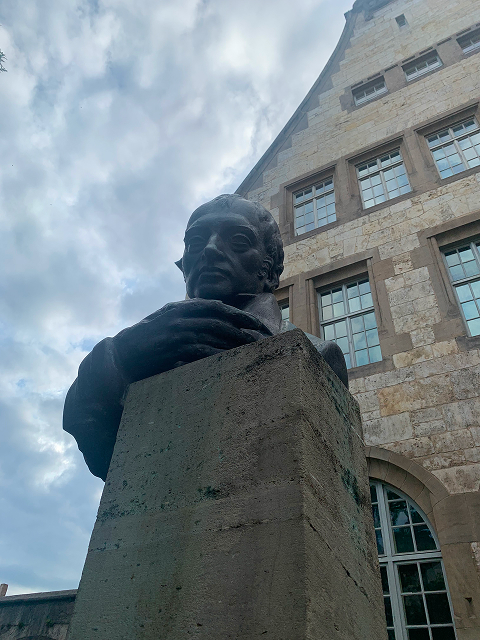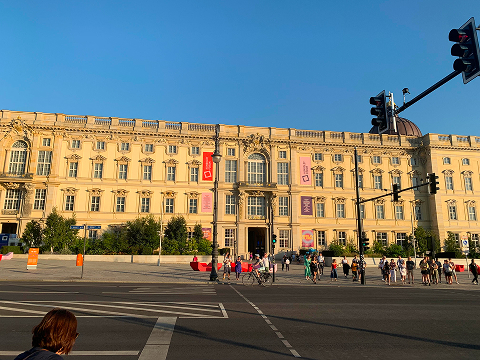2024 Germany
Summer Seminar Report – Jena & Berlin , Germany
September 25, 2024
Osaka University Third-year student in the doctoral program
Introduction
In August 2024, I participated in a summer school in Germany, which consisted of lectures and research presentations in Jena from August 17 to 22 and field studies mainly in Berlin from August 22 to 25. During the summer school, I had great opportunities to interact with Prof. Martin Leiner and Prof. Laura Villanueva of the Friedrich-Schiller-Universität Jena, as well as other professors and young researchers who are involved in various fields of reconciliation studies.
In this report, I would like to describe my thoughts mainly through the presentation of my research in Jena and the reactions to it, as well as through the field study in Berlin.

Statue of Hegel
Jena: Seminars and Research Presentations
The seminar in Jena consisted mainly of lectures on reconciliation studies, exercises (group work) to learn about trans-disciplinary approaches to reconciliation studies, and research presentations. In the following, I would like to focus on my presentation.
I gave a presentation entitled “Modern Japanese Philosophy and Colonialism: Rethinking Nishida Kitarō’s Philosophy of the Other.” The presentation was intended to make a theoretical contribution to reconciliation studies by reinterpreting modern Japanese philosophy, my field of specialization, from the perspective of postcolonial studies. The following is a very brief summary of the contents of the presentation.
Summary of My Presentation
Nishida Kitarō’s (1870-1945) philosophy, the subject of my research, has attracted international attention in recent years and has been evaluated as providing the basis for “multiculturalism” in this context. In this interpretation, Nishida’s concept of a “place of absolute nothingness” that encompasses all particulars within itself is evaluated as philosophically presenting an ideal world in which all particular cultures do not discriminate against nor dominate each other, but are harmoniously encompassed.
However, while being evaluated as such, Nishida also left behind a discourse that justified colonialism. During the war, Nishida justified the inclusion, or domination, of other Asian countries and peoples by associating the position of absolute nothingness with the “Japanese race” and the “imperial household.”
Here I thought that we should question the very assumption that we all share the same universality. It is beautiful to present absolute universality and to extol multiculturalism under the banner of such universality, but then we tend to forget that this absolute universality may be linked to people with certain attributes. In other words, what we need to consider is that universality itself is always biased. In this presentation, referring to Sakai Naoki, William Haver, and others, I pointed out that the universality called “humanity” has in fact been historically constituted by discriminating and excluding certain people, and raised doubts about the above universalism.
I then pointed out that the theory of the other in Nishida’s middle period depicts a relationship with the other that does not presuppose any universality. Nishida does not emphasize analogy or empathy, the mode of projecting one’s own feelings onto others, but rather, accidental encounters with others, in which one cannot predict what will happen. Here I see the possibility of majorities giving up their own comfort and opening up to accidental encounters with minorities. I believe that this position allows majorities to overcome the model in which they set their own universality as the standard and imposes it on minorities as the other.
Finally, I concluded my presentation by suggesting that what is important in considering reconciliation with others is to revoke the universality in which majorities occupy a position and to be open to such accidental encounters.
Comments on My Presentation and Responses to Them
I received a number of useful questions and comments in regard to the above presentation. I would like to introduce a few of them below.
First, Prof. Leiner and Prof. Villanueva asked me how I specifically intended to develop my future research and how I could contribute to the practical issues. I honestly told them that I was not sure whether I should continue to contribute to reconciliation studies through philosophical research or shift to more practical research. After my presentation, Prof. Umemori Naoyuki and Prof. Kuroda Kazuo of Waseda University commented that they hoped that I would make use of the perspectives of my philosophical research in reconciliation studies. These comments gave me an opportunity to think about my future plan.
Next, Prof. Kumagai Naoko of Aoyama Gakuin University commented on my criticism of empathy. This is because empathy for others is generally presented as essential in reconciliation studies. I responded that by using the word “empathy,” we may project our position onto others and distort their voices.
Furthermore, on a separate occasion from the Q&A session, Prof. Umemori asked me if perhaps I could approach the subject of reconciliation with nature from the perspective of Nishida’s philosophy. I replied that it is probably possible to interpret Nishida’s philosophy in a non-anthropocentric way, and that from this it might be possible to draw out the possibility of rewriting the concept of reconciliation to include nonhuman actors.
Berlin: Museums and Colonialism
In Berlin, we visited historical sites and museums related to World War II and the Cold War. At each site, Prof. Leiner gave us detailed guided tours, which helped us to gain more knowledge. In addition, since the members of the group were professors and young researchers with backgrounds in various fields, we were able to gain a comparative perspective not only from Germany but also from Lithuania, Taiwan, Vietnam, and other countries.
I am sure that other people have probably already described in detail the historical sites and museums that we visited in our official schedule. Therefore, I would like to introduce the guided trip by Prof. Leiner and Prof. Villanueva for those who wanted to visit after the official schedule on August 24, and the Humboldt Forum, which was recommended by Prof. Leiner.

Humboldt Forum
After the official schedule was over, Prof. Leiner and Prof. Villanueva took applicants (Dr. Kawaguchi Hiroko, Dr. Tsuneishi Norihiko, Mr. CHEN Chih Kang, and me) to the Marx-Engels-Forum and Humboldt-Forum neighborhoods. The square where meetings were held during the Nazi era and the buildings from the East German era still remain, and we could feel the historical multiple layers of Berlin.
After a brief tour of the area, Prof. Leiner informed us that many of Berlin’s museums and galleries were open until midnight that day. He recommended several museums. We visited one of them, the Humboldt Forum. It is a museum that holds mainly non-European art, including African and Asian art. The museum itself is huge, so we decided to visit the exhibits about the history of the Humboldt Forum itself, Africa, and Asia.
The exhibit on Africa left the greatest impression on me. It was very interesting because it reflected on the colonialist and discriminatory activities of German and other Western anthropologists.
Let me introduce one display. In this display, visitors were asked to look into a series of black box-like devices with holes in them. When visitors look into the boxes, they see images of pottery and other artifacts from various African cultures. However, only the box placed in the center had a dark (black?) mirror in it instead of the images. Therefore, when one looked into it, one’s own face was reflected.
I found this display very interesting. In my interpretation, what is being aimed at by this display is probably as follows: This makes the visitor aware that “we,” as observers, colonizers and perhaps Westerners, are not only looking at African people, but also that they are looking at “us.” In other words, it will have the effect of making visitors reflect on the fact that African people are not objects of observation, but that they are living as subjects of their own lives. Furthermore, this display will make visitors aware of how they are looking at African people. This experience-based display forced visitors to reflect on their colonialist or discriminatory gaze.
It made me think that it is necessary to practice reconciliation studies not only through academic discourse, but also through experiences and art.
Finally, I would like to express my deepest gratitude to Prof. Asano Toyomi of Waseda University and Prof. Leiner and Prof. Villanueva of Jena for leading this wonderful summer school. I would also like to thank Dr. Kawaguchi and Dr. Onozaka Hjime of Waseda University for taking time out of their busy schedules to prepare for this program.
I am very happy to have had the opportunity to get to know and interact with wonderful researchers through this summer school. I am sure that the experience and network I gained during the summer school will be helpful for my research in the future.

